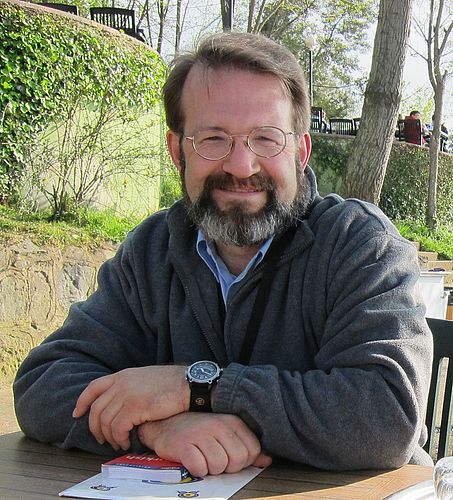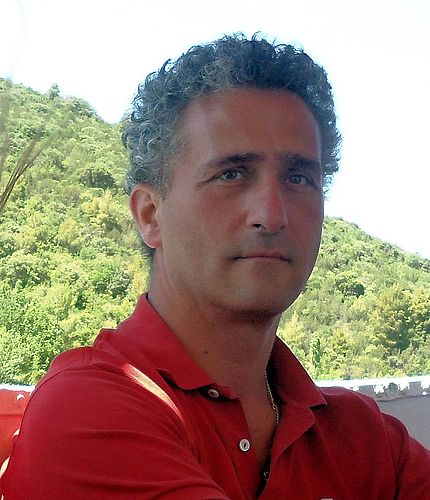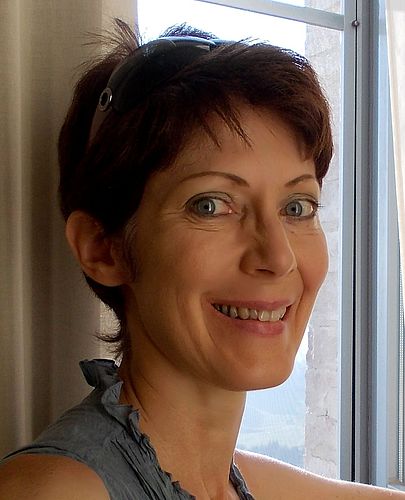Faculty and Presenters
 Maureen C. Miller, Seminar Co-Director
Maureen C. Miller, Seminar Co-Director
Reform and material culture have been central preoccupations in Miller's research since her award-winning first monograph on demography, the built environment, and ecclesiastical change in medieval Verona. She deepened her engagement with the politics of material culture in her second book, The Bishop's Palace: Architecture and Authority in Medieval Italy, winner of the Marraro Prize of the Society for Italian Historical Studies in 2001, and has a new monograph in press, entitled Clerical Clothing in Medieval Europe, 800-1200, that links clothing, lordship, and reform. In this new interdisciplinary, European-wide exploration of clerical attire, Miller establishes new connections between Carolingian renewal and later reform initiatives by drawing upon liturgical, political, textile and literary sources. Her dedication to engaging students on issues of renewal and reform is evident in her widely used collection of sources in translation, Power and the Holy in the Age of the Investiture Conflict: A Brief Documentary History as well as the translations she contributed to Reading the Middle Ages: Sources from Europe, Byzantium, and the Islamic World and Medieval Italy: Texts in Translation. She is presently writing a book on clerical clothing in medieval Rome that is to be published by Viella in Agostino Paravicini Bagliani's series, La corte dei papi.
 William North, Seminar Co-Director
William North, Seminar Co-Director
William North’s interests center on the intersection between ideas and institutional change, and his early work focused on the role of biblical exegesis in the circle of Roman reformers around the reformed papal curia in the late eleventh and early twelfth century. He is particularly interested in the processes of clerical formation, tensions in clerical and monastic identities, and the role of different discourses and media in bringing about changes in thought and behavior. Recently, he has focused on understanding the means by which clergy were guided in developing the cognitive ability to work with canonical sources, with Roman reformer Bonizo of Sutri as a major source. These interests come together in his long term project tentatively titled: The Word, the Spirit, and the Flesh: Exegesis and the Transformation of Clerical Culture in the Age of Reform (1050-1130). North is a dedicated translator and is currently completing two collections of translated sources, one focused on the Saxon War (1072-1082) that coincides with Gregory VII’s papacy (to be published by Catholic University Press), the other a co-authored collection of translated sources from the period 900-1050 (to be published by the University of Toronto Press). He has also contributed to Reading the Middle Ages: Sources from Europe, Byzantium, and the Islamic World and Medieval Italy: Texts in Translation. He has also translated many other primary sources and scholarly articles on the period of the Gregorian Reform for teaching purposes.
 Maya Maskarinec, Program Assistant
Maya Maskarinec, Program Assistant
Maya Maskarinec is a graduate student in the Department of History at UCLA and currently the Phyllis G. Gordan Rome Prize Holder in Medieval Studies at the American Academy in Rome, where she is completing a dissertation on the role of Rome as a vital entrepot in the generation and circulation of saints' cults in early medieval Europe entitled, Building Rome Saint by Saint. Sanctity from abroad at home in the city (6th-9th century). Maya also participated in the 2010 NEH Seminar held at the American Academy in Rome.
Participating Scholars
 Tommaso di Carpegna Falconieri
Tommaso di Carpegna Falconieri
Tommaso di Carpegna Falconieri received his University degree (Laurea) in 1992 from the Università di Roma La Sapienza. In 1996 he completed his PhD (Dottorato di Ricerca) in Medieval History at the Università Cattolica in Milan. Since 1998 he has been collaborating with the Università di Urbino, where at present is “ricercatore confermato” (permanent researcher) and professor of Medieval History. His principal research themes are the history of Rome, the Roman Church, and Central Italy in the Middle Ages, with a specific focus on historical sources and the relationships between historical fact and its representation in imagination. Currently, he is concentrating on the use of ideas of the Middle Ages in contemporary politics. Among his recent publications are: Il clero di Roma nel medioevo. Istituzioni e politica cittadina (secoli VIII-XIII) (Viella, 2002), Cola di Rienzo (Salerno Editrice, 2002); The Man Who Believed He Was King of France (Engl., trans. UChicago Press, 2008); and most recently Medioevo militante. La politica di oggi alle prese con barbari e crociati (Einaudi, 2011).
 Lila Yawn
Lila Yawn
Lila Yawn (Ph.D., University of North Carolina at Chapel Hill, 2004) is Assistant Professor of Art History at John Cabot University in Rome and an Arts and Humanities Advisor at the American Academy in Rome, where she was a Rome Prize Fellow from 1996 to 1998. Her research focuses on medieval Italy—giant church books, papal schisms, mythic and ritual reuses of antiquities, cityscapes—and on perceptions and evocations of the Middle Ages in the twentieth and twenty-first centuries.
 Maureen C. Miller, Seminar Co-Director
Maureen C. Miller, Seminar Co-Director William North, Seminar Co-Director
William North, Seminar Co-Director Maya Maskarinec, Program Assistant
Maya Maskarinec, Program Assistant Tommaso di Carpegna Falconieri
Tommaso di Carpegna Falconieri Lila Yawn
Lila Yawn 